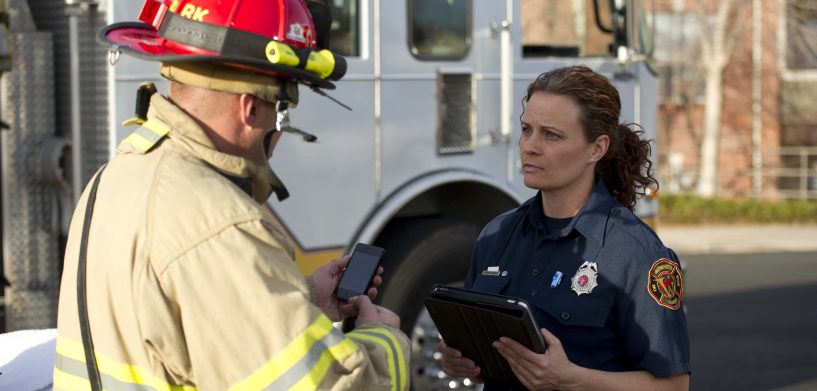Our world is shrinking. Or at least the devices that access our digital world are. These days the number one computer we use most often is our smartphone. And sure, we have laptops and tablets, but these aren’t on us 24/7 like our smartphones are.
This trend also appears to be the case in public safety. Organisations want to provide field officers with information to keep them safe, including outside of the patrol car, at the roadside, in buildings, and in people’s homes. Smartphones are great at providing information at the fingertips of a field officer.
But, they’re small! The portability is great, but the screen sizes are tiny, in comparison to a laptop. Looking up information and filling in forms can be a bit of a chore on a tiny screen. Having a smartphone-specific user interface improves this interaction. But what would a future experience look like beyond this?
We see this today in our personal lives with Apple’s Siri, the Google Assistant, and Amazon’s Alexa. An interface that goes beyond the screen straight to an audio only interface. Public safety organisations know the advantages of an audio interface. They’ve been using radio communications for decades. Today, the other end of the radio has been one person, using up airtime on one channel and causing congestion and delays.
Imagine if queries like a vehicle plate lookup happen by speaking to a virtual assistant. The field officer’s benefit is access to critical information, improving their situational awareness. But all in a way that keeps their eyes up and aware of their surroundings, rather than focused on a screen in their hand. The virtual assistant would be private to that field officer. This keeps the radio channel clear of simple lookups. This also frees up dispatchers to focus on complex interactions.
This world of virtual assistants is coming. It’s already here in a personal context. It’ll be here in a public safety context soon. The technology to enable it already exists, but there are hurdles. It’s one thing to ask Alexa to play your favourite song and be misheard. It’s another thing when you’re trying to look up a vehicle license plate.
Where to from there? Simple lookups, what’s around me, what do I need to do. Virtual Assistants can answer these contextual questions. This, in turn, helps public safety organisations deal with increased demand and results in safer cities.
![]() Waylon Kenning is the product manager for Intergraph OnDuty, a new suite of public safety mobile apps from Hexagon Safety & Infrastructure. Based in Wellington, New Zealand, Waylon was embedded within New Zealand Police learning real world examples of how mobility can help police officers. Before Hexagon, Waylon was involved with creating mobile apps for one of New Zealand’s largest organizations, as well as creating a mobile-focused start-up for energy companies. Outside of work, Waylon is a travel vlogger, and can be found on YouTube traveling and laughing around the world with his wife Kathryn.
Waylon Kenning is the product manager for Intergraph OnDuty, a new suite of public safety mobile apps from Hexagon Safety & Infrastructure. Based in Wellington, New Zealand, Waylon was embedded within New Zealand Police learning real world examples of how mobility can help police officers. Before Hexagon, Waylon was involved with creating mobile apps for one of New Zealand’s largest organizations, as well as creating a mobile-focused start-up for energy companies. Outside of work, Waylon is a travel vlogger, and can be found on YouTube traveling and laughing around the world with his wife Kathryn.

















